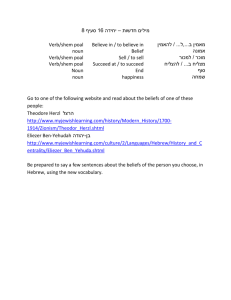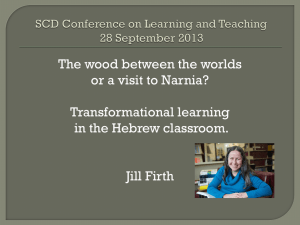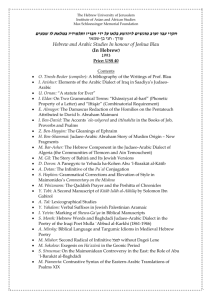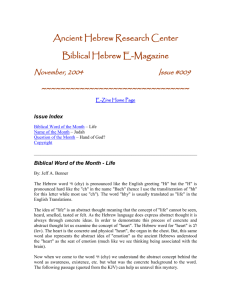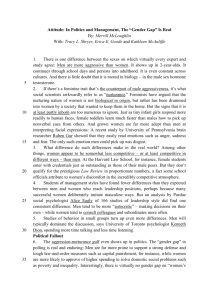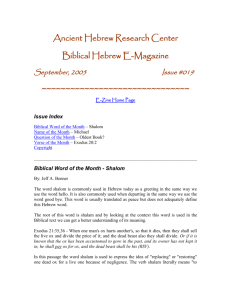Biblical Hebrew E-Magazine - Ancient Hebrew Research Center
advertisement
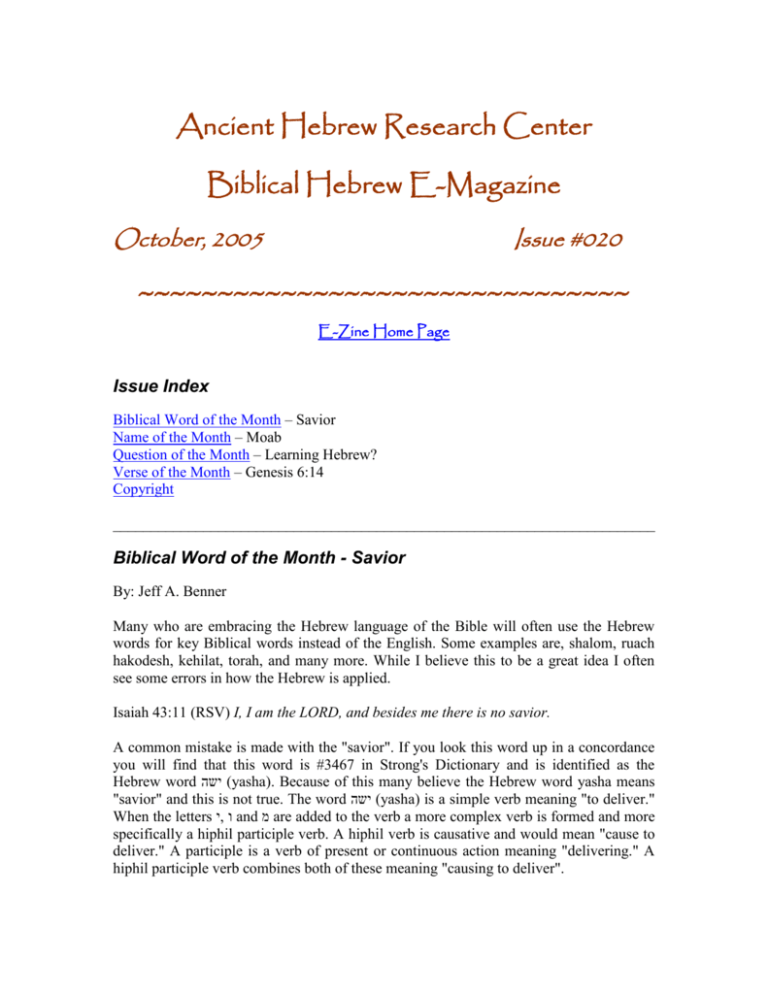
Ancient Hebrew Research Center Biblical Hebrew E-Magazine October, 2005 Issue #020 ~~~~~~~~~~~~~~~~~~~~~~~~~~~~~~~ E-Zine Home Page Issue Index Biblical Word of the Month – Savior Name of the Month – Moab Question of the Month – Learning Hebrew? Verse of the Month – Genesis 6:14 Copyright ________________________________________________________________________ Biblical Word of the Month - Savior By: Jeff A. Benner Many who are embracing the Hebrew language of the Bible will often use the Hebrew words for key Biblical words instead of the English. Some examples are, shalom, ruach hakodesh, kehilat, torah, and many more. While I believe this to be a great idea I often see some errors in how the Hebrew is applied. Isaiah 43:11 (RSV) I, I am the LORD, and besides me there is no savior. A common mistake is made with the "savior". If you look this word up in a concordance you will find that this word is #3467 in Strong's Dictionary and is identified as the Hebrew word ( ישהyasha). Because of this many believe the Hebrew word yasha means "savior" and this is not true. The word ( ישהyasha) is a simple verb meaning "to deliver." When the letters י, וand מare added to the verb a more complex verb is formed and more specifically a hiphil participle verb. A hiphil verb is causative and would mean "cause to deliver." A participle is a verb of present or continuous action meaning "delivering." A hiphil participle verb combines both of these meaning "causing to deliver". Biblical Hebrew E-Magazine In Biblical Hebrew there is a fine line between verbs and nouns and both can be used to describe an action or a person, place or thing. The word ) מושיהmoshiah( can be used in the sense of an action as in Deuteronomy 28:29 where it is translated as "save" but literally means "causing to be delivered." The same word can be used as a noun as in Isaiah 43:11 where it is translated as "savior" but literally means "one who is causing to be delivered." The word moshiah (as a noun) is generally translated two different ways as shown below. Isaiah 43:11 (RSV) I, I am the LORD, and besides me there is no savior. Judges 3:15 (RSV) But when the people of Israel cried to the LORD, the LORD raised up for them a deliverer, Ehud, the son of Gera As the words savior and deliverer are the same Hebrew word there appears to be a contradiction between these two verses. If God is the only savior how can there be another savior such as Ehud? A good understanding of what the word moshiah means is critical in proper interpretation of the Hebrew Bible. As the verb moshiah is a hiphil verb meaning "to cause to be delivered" we can see that God is one who "causes to be delivered" and this can be done by the hand of God himself or by sending another to be the agent of the deliverance. Israel's deliverance is caused by God, the one and only moshiah, who sent Ehud. There is one other point to make concerning the word moshiah. Remember that this verb/noun is written in the participle form. God is not one who has delivered (past tense) and he is not the one who will deliver (future tense) he is the one who "IS DELIVERING" (present tense). ________________________________________________________________________ Name of the Month - Moab By: Jeff A. Benner This name is pronounced "mo-ahv" in Hebrew. The base word is "ahv" meaning "father." The prefix "mo" means "from". Combined these mean "from father." Mo'av was the son of Lot's oldest daughter and Lot himself (Genesis 19:35), the product of an incest relationship. According to the Torah, no descendent of Mo'av is allowed in the assembly of Israel (Deuteronomy 23:3). Why does God not allow this? Character traits are passed down from generation to generation and the Moabites had passed down the character trait of incest, strictly forbidden in Torah, through its generations. If no Moabite is allowed into the assembly, why was Ruth, a Moabitess, allowed in the assembly of Israel? 2 Biblical Hebrew E-Magazine An Ancient Hebraic understanding of what a "descendent" is, is important for understanding this apparent contradiction. While a descendent is one who is physically descended from a group of people it can also be used for one who holds the character of a group of people. In Jeremiah 23:14 God saw Israel as Sodom and Gomorrah, not because they were physically descended from the inhabitants of Sodom and Gomorrah, but because their actions were the same as those in Sodom and Gomorrah. Ruth was a Moabitess but was allowed in the assembly of Israel because she was no longer considered a Moabitess. Her character had been changed to become like Israel when she said "your God will be my God and your people will be my people." Ruth had become an Israelite through her actions leaving behind the character of the Moabites. _______________________________________________________________________ Question of the Month – Learning Hebrew? By: Jeff A. Benner Q: Which should I learn first, Ancient/Biblical Hebrew or Modern Hebrew? A: First it is important that the term Hebrew, when applied to speech, can be divided into two parts; 1. The script used to write the language which began thousands of years ago as pictographs similar to Egyptian Hieroglyphs and has evolved to the modern square script used today in Israel. 2. The language and how thoughts and ideas are expressed in sentence form. Modern Hebrew is a modern abstract oriented language and is very different from Biblical Hebrew which is a concrete oriented language. Once it is understood that Hebrew can mean the script and/or the language here is my recommendations for learning Hebrew. 1. Learn the modern script as almost all published material on Biblical Hebrew uses this script. This way you will be able to use these materials. 2. Learn the Biblical Hebrew meaning of words rather than Modern as your goal is to learn the meaning of the Biblical text. Only if you want to be able to speak to others in Hebrew, such as in Israel, than you need to learn Modern Hebrew. ________________________________________________________________________ 3 Biblical Hebrew E-Magazine Verse of the Month – Genesis 6:14 By: Jeff A. Benner עֲשֵׂ ה ְלָך ֵׂתבַ ת עֲצֵׂ י־ ֹגפֶר ִקנִים ַתעֲשֶ ה ֶאת־הַ ֵׂתבָ ה וְ ָכפ ְַר ָת ּומחּוץ בַ ֹכפֶר׃ ִ א ָֹתּה ִמבַ יִת Make thee an ark of gopher wood; rooms shalt thou make in the ark, and shalt pitch it within and without with pitch. (ASV) ( עֲשֵׂ הah-sah) This is a verb meaning "to do" and is often used in the context of making and is written in the imperative tense, similar to a command. ( ְלָךleh-khah) The first letter is the prefix meaning "to" or "for." The second letter is the suffix meaning "you." Combined this word means "to you." ( ֵׂתבַ תtey-vaht) The base word is ( תנהtey-vah) meaning a "box." When one noun is followed by another noun the two nouns become a construct so this word would be translated as "box of..." Also, when a noun ending with the letter הis used in the construct, the הis changed to a ת. So, tey-vah becomes tey-vat. ( עֲצֵׂ יa-tsey) The base word is eyt meaning a tree. This word includes the plural suffix יםand the plural form of this word means “wood.” This noun is also followed by another noun and is therefore "wood of.." Also, when a noun ending with the suffix ים, is used in the construct, the םis dropped off the end of the word. ( ֹג ֶפרgo-pher) This noun is an unknown type of tree and is therefore often transliterated as gopher while some translate it as cypress. ִקנִים (qiy-niym) The base word qeyn means a "nest" and is written in the plural form meaning "nests." ( ַתעֲשֶ הtah-ah-seh) The base word is the verb ah-sah, the same verb that began this verse. When the prefix ת is added we know that the verb is "second person, masculine, singular, imperfect tense" meaning "you will do" or "you will make." ( ֶאתet) This word is used to identify the direct object of the previous verse. 4 Biblical Hebrew E-Magazine ( הַ ֵׂתבָ הha-tey-vah) The base word is again tey-vah with the prefix הmeaning "the". It is the "the" that makes this noun the direct object of the verb ah-sah. ( וְ ָכ ַפ ְר ָתveh-khah-phar-tah) The base word is the verb ( כפרkaphar) meaning to "cover." When the suffix תis added to the verb we know that the verb is "second person, masculine, singular, perfect tense" meaning "you did" or "you made". The prefix וmeans "and" and when this prefix is added to a verb it reverses the tense so instead of being perfect tense it becomes imperfect tense meaning "you will do" or "you will make." ( א ָֹתּהoh-tah) The base word is את, the same word as above which is used to identify the direct object of the verb. The suffix הis the feminine pronoun meaning "her" and is the direct object of the previous verb. The Hebrew word tevah is a feminine word and is the "her" of this word. ( ִמבַ יִתmee-bah-yit) The base word is ( ביתbah-yit) meaning a house but in the context of this verse means "inside". The prefix מmeans "from." ּומחּוץ ִ (uw-mee-hhuts) The base word is ( חוץhhuts) meaning outside. The prefix מmeans "from" and the second prefix וmeans "and." ( בַ ֹכפֶרbah-ko-pher) The base word is kopher meaning a "covering", this is the noun form of the verb kaphar above. The prefix בmeans "in" or "with." The following is a literal rendering of this verse from its Hebraic meaning. Make for you a box of woods of gopher nests you will make the box and you will cover her from the inside and from the outside with a covering. ________________________________________________________________________ Copyright © 2005 Jeff A. Benner Ancient Hebrew Research Center Please feel free to use, copy or distribute any material within the "Biblical Hebrew E-Magazine" for nonprofit educational purposes only. ________________________________________________________________________ 5
